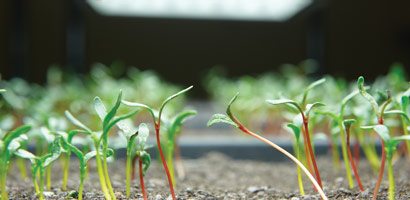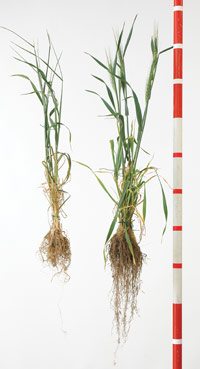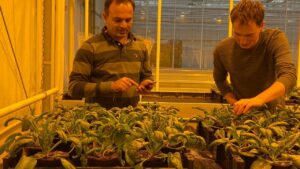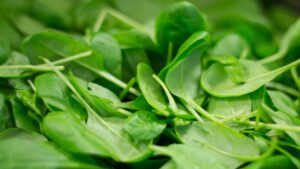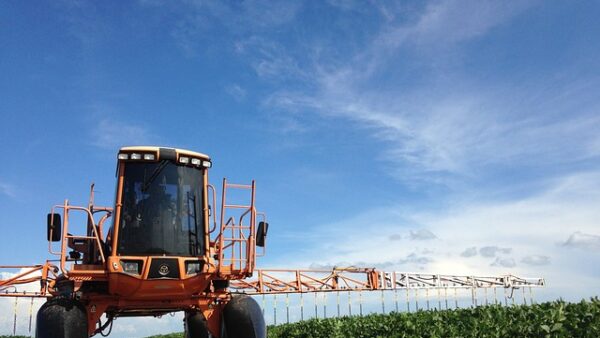North American companies are developing, testing and marketing new technologies to improve the performance of seed.
Seed enhancements are commonplace in North American agriculture—they are designed to improve seed’s germination and growth, make planting and harvesting easier, and deliver valuable nutrients and inoculants needed at sowing. Companies across the U.S. and Canada are introducing new products and processes to help growers adapt to changing climatic conditions while increasing profit margins.
Controlling Disease through Disinfection
Before seed germinates, its health can be enhanced by seed disinfection to eradicate seed-infecting pathogens from the seed coat, the embryo or both. Developed in Sweden by INCOTEC for field crops, and approved for commercial use in 2003, the ThermoSeed process is being adapted for vegetable seed disinfection and is currently available for some crops. This process will offer growers cost-effective control of fungal pathogens, improved seed vigor, and better crop emergence, density and yield.
“Having proven its qualities in field crops, much effort was made to adjust this method to other crops,” says Kortsen. “The positive results have now encouraged us to expedite the commercial ThermoSeed treatment of vegetable seeds.” Successful studies have been conducted on spinach, carrots, onions, Chinese chives, lamb’s lettuce, parsley, cabbage, peas, red clover, beans, sugar beets and tomatoes.
Innovations in disinfection don’t stop with ThermoSeed. Germains Seed Technology is now ready to launch goSeed Disinfection Spinach, a multi-stage disinfection treatment for spinach designed to reduce seed-borne fungal pathogens to almost non-detectable levels. As well as removing fungal pathogens, the new disinfection product promises to speed emergence and helps produce an overall healthier plant, according to Lucy Miller, marketing manager with the King’s Lynn, U.K. company. Data from North American trials shows that the treatment helps significantly reduce on-seed infection from verticillium wilt, fusarium wilt, cladosporium leaf spot, stempylium leaf spot and leaf spot.
The company’s spinach disinfection technology will be available late this summer, pending approval from the EPA on a Section 18 Emergency Exemption. Ongoing trial work is taking place for a Section 3 Label registration, Miller says.
Getting Off to a Good Start
Seed priming is used to encourage seeds to sprout faster and with more uniformity after planting. This is a process by which seed moisture content is increased to a very high level, when the seed is exposed to an optimal temperature, with the high moisture content maintained for a specific length of time. This starts the germination process without allowing radicle protrusion. Then the seed is dried to normal moisture content, and is ready to package.
Harris Moran Seed Company in Modesto, Calif., has developed LighteningStart, a seed priming process designed to improve the speed and uniformity of seed germination, especially under cool conditions.
“The key to superior seed priming is to tailor the process to the particular seed lot,” says Keith Kubik, seed physiologist with Harris Moran. “LighteningStart does this by characterizing each lot before priming, in order to determine the best priming moisture and priming length to use. This preliminary characterization, along with the very gentle, seed-friendly process, results in the more uniform, faster establishing seed that growers want.”
Giving seeds a head start is also the thinking behind Wolf Trax, Inc.’s PROTINUS Seed Nutrition product. A patented seed-applied fertilizer, PROTINUS provides plants with small amounts of nutrients right after they germinate, before they are mature enough to access soil nutrients on their own.
“By improving early plant nutrition, growers see the benefit in crop establishment, early-season growth, and the ability to withstanding challenging growing conditions. This all adds up to better yield potential,” says Jennifer Bailes, Wolf Trax’s director of seed products and innovations, in Winnipeg, Man.
In addition to speeding up emergence by one to two days, treating seed with PROTINUS results in seedlings that are 15 percent larger, with roots up to 20 percent more developed. PROTINUS field trials have shown positive results for corn, soybeans, canola, cotton, cereals, forages, grasses and vegetable crops, says Bailes.
INCOTEC’s GeniusCoat is also aimed at boosting crop nutrition and stimulating root development and mass. “Fostering the seed’s miniscule nutrition requirements at germination triggers a chain reaction that affects the entire growth period, resulting ultimately in a significantly enhanced maximum yield potential,” says Brad Kortsen, INCOTEC’s sales and marketing manager.
Increased yield is one of GeniusCoat’s goals—stronger seedlings mean thicker stands, faster growth and more tillers. Data from 73 field trials, conducted by INCOTEC on wheat plots located on various continents and under varying climatological conditions, shows an average yield increase of 4.5 percent. Crops from seeds treated with GeniusCoat also have higher straw production and protein content, as well as better baking quality.
In addition, INCOTEC, with the recent acquisition of AgriCoat, is offering Natural II, an organic seed treatment for spinach and other commercial vegetable crops that promotes growth.
Meanwhile, Novozymes is concentrating on the ever-growing North American soybean market with their patent-pending seed treatment CUE. The treatment, which uses isoflavonoids, gives seed companies the ability to differentiate between seed genetics and traits, while providing yield increases of one to two bushels. The company also offers REVV, containing similar technology, for cotton crops.
CUE and REVV trigger beneficial fungi in the root zone before the plant can naturally activate them. “They enhance the root structure, improving nutrient, water and phosphorus uptake to overcome environmental stress,” says Francis Leier, the company’s international business development manager.
Polymers and Pellets Help Growers
There is no question that seed treatments can boost plant development and growth, but only if the treatments stay on the seeds. Becker Underwood’s Flo Rite 1127 Concentrate for soybeans and Flo Rite 1197 for corn, canola, wheat and other crops are plantability polymers. A polymer can be added to a slurry tank and applied along with a fungicide and/or insecticide. The company says these polymers help reduce seed bridging and clumping during handling for improved flow during seed conditioning and treatment operations.
“Once applied to a seed, a plantability polymer will help growers maximize the yield potential of their high-value genetics by increasing seed drop accuracy, reducing planter skips and improving the uniformity of seed placement, “ says Stephanie Zumbach, product manager for seed enhancements.
Becker Underwood recently announced a lower application rate for Flo Rite 1127 Concentrate when only a fungicide seed treatment is used. “We recognize that some treaters choose to apply only a fungicide,” says Zumbach. “Our testing has shown the new lower three-quarters of a fluid ounce application rate for Flo Rite 1127 Concentrate will still give these treaters and their growers the benefit of controlling dust-off and improving plantability when they apply just a fungicide.”
Ball Seed, headquartered in West Chicago, Ill., offers Ball Controlled Growth seed, which is treated with a plant growth retardant to promote even germination and seedling growth for ease when transplanting. By using this coated or pelleted seed, the company says growers can save time and money by skipping one or two PGR spray applications.
Seed pelleting was developed using technology originally designed for the confectionary and pharmaceutical industries. The technology has taken off recently in the seed industry and is commonly used to round out irregularly-shaped seed or make small seed larger for ease of handling. PanAmerican Seed sells Fuseables Multi-pellets and SimplySalad which combine a mixture of two or three varieties of floral or lettuce seeds in a single pellet, making it easier for nurseries to offer baskets and pots of attractive mixes to their customers.
Seed industry technology will keep evolving to solve problems facing seed growers. Seed enhancements such as disinfection, priming, nutritional inputs, polymer application, coating and pelleting are some of the recent developments that North American seed growers can use to increase their bottom lines. Andrea Geary


